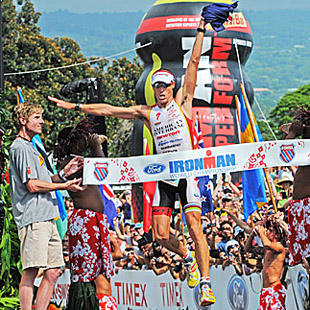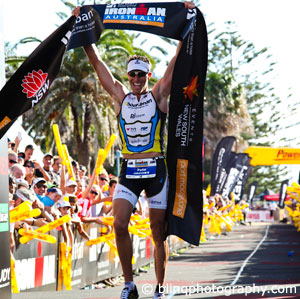Pete Jacobs breaks through
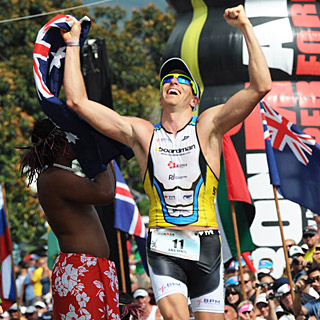
Every year at Kona, somebody on the verge of Ironman stardom steps up and breaks up the ruling establishment on the Queen K. Coming up to October 8, there were several candidates for the role of intruder to greatness on the sport's biggest stage. We are not talking Hollywood-style zero to hero transformation. Except for Chrissie Wellington, there are no absolute dark horses prevailing at this level. In the mens race, we are talking about a bunch of guys who've won a small Ironman or two, placed close at some of the bigger races, have one or two aces in their arsenal and brash hopes of finessing their weakest links.
And so this year, like all the others, there was plenty of tea leaves and some hard evidence to say that folks like Frederik Van Lierde, or Tim O'Donnell, or Andi Bocherer or half a dozen other relative newcomers might be the one who catches lightning in a bottle.
As the lava turns, the man this year was Pete Jacobs of Australia.
Jacobs, of course, was not National Velvet – a mythic phenom without a past grabbing the brass ring in their first crack at the big time. Jacobs is 29 and has been a pro for nearly eight years. He's placed second twice and third once at Challenge Roth. He's won the Busselton half four times. This spring he won his first Ironman at Port Macquairie. And most important, he's been on the Kona stage three times and has not wilted, taking 8th in 2009 and 9th last year. Even more important, Jacobs has always been a first pack swimmer who can run like the wind. Last year he posted a 2:41:05, the fastest marathon of the day and third fastest ever posted at the Hawaiian Ironman – only a few ticks of the clock slower than the great Mark Allen's 1989 split.
With those two golden bookends required for Ironman success, Jacobs only had to fill the middle in the one discipline that most new triathletes find it easiest to learn – the bike. But even Pete with the winged feet could not make up for a 4:47:04 bike that gave up 15 minutes to Macca and the winning chase pack. So Jacobs zoomed past dozens on the run but could only advance to 9th place.
Which should have inspired Jacobs to work on his bike and polish up his stellar run this year. Only a stress fracture in his foot threw a wrench in his usual Kona prep and left him decidedly under the radar and a candidate for the dreaded Did Not Start category.
As the tri world now knows, at age 29 Jacobs was ready for his close-up. He was second out of the water in 51:38. He held on through half of the bike before fading to 4:31:03, thus surrendering 7 minutes to the serious contenders including Craig Alexander, Marino Vanhoenacker, Dirk Bockel, Andi Bocherer, Andreas Raelert, Raynard Tissink et al. Out of the top 10, 10 minutes down to Chris Lieto and more than 5 minutes back of Alexander's crowd, Jacobs went to work and put together his second straight masterpiece of a run that put him into the spotlight. and in the consciousness of the men who are serious about winning Kona now and in the future.
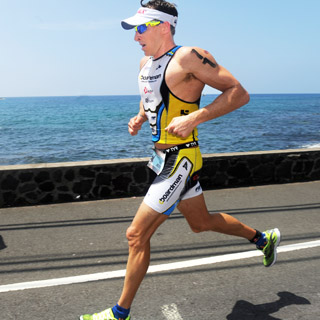
Slowtwitch: What does this finish mean to you?
Pete Jacobs I'm incredibly happy to finish second to Craig [Alexander] and to beat Andreas [Raelert]. For the last 12 months it's been all about those two guys. So to slide in between them and get second place — It was a great feeling to come back from feeling really down on the bike and then to run through to second place.
ST: Your 8:09:11 was actually 4 seconds faster than Mark Allen's 1989 Iron War winning time. You're in good company.
Pete: Lot of other races you could finish second and it's not that big a deal. But to finish second here you should be happy. To finish in 8:09 whatever is really bizarre. A month ago I said to my manager I could go 8:09 — if it is a good day. But it is a dream to go that fast.
ST: How motivating is it to race Craig and Andreas even up?
Pete: It makes me hungry to improve myself. With Craig's three wins, I say once would be nice. So yes, I am really looking forward to next year. I am very motivated to work harder.. To have the fastest run again — and to duel with Andy and Craig.
ST: You had a lot of back and forth on the run with Andreas.
Pete: I passed him and then I ran into some cramps and he caught me again. My quads were absolutely shattered. Last year they were fine. So I think I was probably on a quicker pace this year before that happened. So I am really motivated to come back here next year with a few more miles of training under my belt.
ST: When you passed Andreas, that wasn't final was it?
Pete: I caught him up in the Energy Lab, about 29, 30ks. He pulled into a toilet straightaway, right as I passed him. It just happened to be right there. I was like "Sweet! That should make it easy for me." But then I hit the top of the Energy Lab Road coming to the Queen K and my quads just absolutely shattered. They were just absolutely killing. Extremely sore. And they were only going to get worse.
ST: So what could you do about it?
Pete: I tried to just jog really slowly, to limit the damage on my quads, for about 5k. I walked a few aid stations. And then Andy caught me with about 5k to go. He got about 3 meters in front of me and I thought 'I've got to go with him.' So I tried and before I knew it, I was running faster than him and I just took off. As shattered as my legs were, the slowdown I'd done for 5ks made the difference and I was able to pick it up again. I dropped him and he said later, yeah, I'd cracked him. When he caught me I took off and just went hell for leather. Within the next kilometer, I probably put in a few hundred meters on him and I thought 'I've got to keep second now. I've got to keep it up.' So he dropped off and I was able to come second.
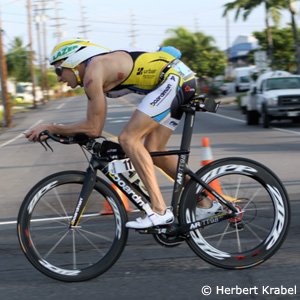
ST: What do you think left you vulnerable near the end of the run?
Pete: I had a stress fracture in my foot earlier in the year and that delayed my training. So next year, I am going to start further out and get better prepared for next year.
ST: Last year your fastest run brought you a small amount of notoriety, but this year you took your two bookends of a great swim and great run and filled in the middle with an excellent bike. How did you get better on the bike?
Pete: I coach myself and I spent a ton more time on the bike. I got a CompuTrainer and I've spent a lot of time on it. I spent nearly more hours on the CompuTrainer than I have on the road.
ST: Why?
Pete: Your legs don’t get a break. It's not like doing four hours on the road. You are not getting a break and you are doing constant wattage and when I feel good I pop the wattage up and when I feel lousy I just cruise but I'm still getting really good cadence and muscle memory. Much more than on the road.
ST: Did you see your bike was better in earlier races?
Pete: Not in earlier races, no. But in training I' rode really well and in the last few weeks I've done some sessions that were really solid. Much more solid than I've ever done.
ST: Did all that bike training affect your run?
Pete: A little bit. It took a while for my run to really pick back up. By August, after my foot injury, I was riding and running well. It took a while to settle out.
ST: You went a lot faster this year on the bike [4:31:03 versus 4:47:04 in 2010]. But you said you didn't feel good on the bike?
Pete: I was a bit disappointed with my bike. It was a combination of getting the taper right — key things like that.
ST: And what else?
Pete: I can say I'm not real happy with how some of the race went. But, I can't deny that it was a good race. Because these are the best athletes in the world.
ST: OK. Come clean. What didn’t you like about your bike?
Pete: I was just not watching up in front of me in the bike pack and a gap opened up. It cost me bit of time, a few minutes, at least on the bike. And the energy trying to make it back up – which I never did.
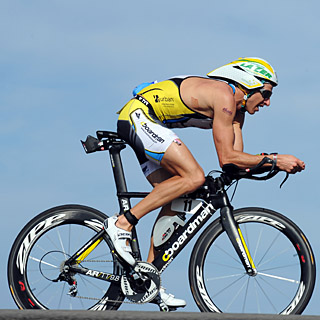
ST: This may not have been perfect, but it wasn't as disastrous as last year. What happened to your bike split last year?
Pete: Last year we got behind and our group, pushed hard to make up 3.5 minutes in 40k or something. This year I didn’t really get the power. So when the gap opened up, I could not close it.
ST: But this time you didn't spend so much energy and time surging back?
Pete: This year I spent about 15k where I was trying to make that gap back up. And so I went hard for 15k and that cost me. Like I said, at the end of the day, I rode in with a few other guys and we were OK.. Just happy to ride in at that pace. Today I rode with Rasmus [Henning] and Freddy van Lierde and we were taking turns — plus a few other guys who were towed along. So I got into town and I was surprised and pleased we were not too far back and I was able to run the rest of them down — except for Crowie.
ST: Were you surprised Craig Alexander went so hard on the bike? That he has transformed himself into an alpha cyclist?
Pete: No not really. He is an awesome cyclist. He's won it. He's not weak. If you are a weak cyclist, you can't run like that, you know? He has always run that quick. But you know? He has won here because he is the best triathlete, you can't deny it. So no, I am not surprised.
ST: This finish must do something for your confidence. How do you see yourself as a competitor now? And your career?
Pete: It's given me a little bit more confidence about my place in this sport. I've always felt a little humbled and embarrassed a bit about what it is that I do. I might look at it that I had a good race and I won. But. really, I would think I can go a lot quicker than that. That is always how I felt. People would congratulate me for winning but inside I was never satisfied. At other races, I felt 'Well, thanks. But it wasn’t that good a race and I'm not really happy with it.'
ST: Will you do anything different next year?
Pete: I have made no plans at all. Everything is up in the air. But I promise you, next year things will be different.


